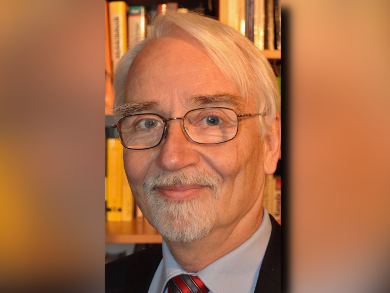Hans-Joachim Werner, University of Stuttgart, Germany, has received the Erich Hückel Award from the Gesellschaft Deutscher Chemiker (GDCh, German Chemical Society). The award was presented at the 54th Symposium on Theoretical Chemistry in Halle (Saale), Germany, on September 18, 2018.
The Erich Hückel Award honors outstanding achievements in the field of theoretical chemistry. Werner is recognized for his contributions to method development in quantum chemistry. He has co-developed the widely used Molpro quantum chemistry software. Werner’s research interests include coupled-cluster and multi-reference methods as well as non-covalent interactions.
Hans-Joachim Werner studied chemistry at the University of Mainz, Germany, and received his Ph.D. in 1977 from the Max-Planck Institute for Biophysical Chemistry, Göttingen, Germany. He completed his habilitation at the University of Frankfurt am Main, Germany, in 1982. From 1982 to 1983, Werner served as a Researcher at the University of Kaiserslautern, Germany, and from 1983 to 1984, he was a Visting Scientist at Los Alamos National Laboratory, NM, USA. He then joined the University of Cambridge, UK, as a Researcher. In 1985, he started to teach at the University of Frankfurt am Main as a Heisenberg Fellow.
In 1987, Werner became Full Professor for Theoretical Chemistry at the University of Bielefeld, Germany. Since 1994, he has served as Full Professor for Theoretical Chemistry and Director of the Institute for Theoretical Chemistry at the University
of Stuttgart. Among other honors, Werner has received the Max-Planck Research Award for International Collaborations in 1996, the Gottfried Wilhelm Leibniz Award of the Deutsche Forschungsgemeinschaft (DFG) in 2000, and the Gay-Lussac Humboldt Award in 2008.
Selected Publications
- Analytical energy gradients for explicitly correlated wave functions. II. Explicitly correlated coupled cluster singles and doubles with perturbative triples corrections: CCSD(T)-F12,
Werner Győrffy, Hans-Joachim Werner,
J. Chem. Phys. 2018, 148, 114104.
https://doi.org/10.1063/1.5020436 - Embedded Multireference Coupled Cluster Theory,
David J. Coughtrie, Robin Giereth, Daniel Kats, Hans-Joachim Werner, Andreas Köhn,
J. Chem. Theory Comput. 2018, 14, 693–709.
https://doi.org/10.1021/acs.jctc.7b01144 - Scalable Electron Correlation Methods. 5. Parallel Perturbative Triples Correction for Explicitly Correlated Local Coupled Cluster with Pair Natural Orbitals,
Qianli Ma, Hans-Joachim Werner,
J. Chem. Theory Comput. 2017, 14, 198–215.
https://doi.org/10.1021/acs.jctc.7b01141 - The Electronic Ground State of [Fe(CO)3(NO)]−: A Spectroscopic and Theoretical Study,
Johannes E. M. N. Klein, Burkhard Miehlich, Michael S. Holzwarth, Matthias Bauer, Magdalena Milek, Marat M. Khusniyarov, Gerald Knizia, Hans-Joachim Werner, Bernd Plietker,
Angew. Chem. Int. Ed. 2014, 53, 1790–1794.
https://doi.org/10.1002/anie.201309767 - Molpro: a general-purpose quantum chemistry program package,
Hans-Joachim Werner, Peter J. Knowles, Gerald Knizia, Frederick R. Manby, Martin Schütz,
WIREs Comput. Mol. Sci. 2012, 2, 242–253.
https://doi.org/10.1002/wcms.82 - Simplified CCSD(T)-F12 methods: Theory and benchmarks,
Gerald Knizia, Thomas B. Adler, Hans-Joachim Werner,
J. Chem. Phys. 2009, 130, 054104.
https://doi.org/10.1063/1.3054300 - A simple and efficient CCSD(T)-F12 approximation,
Thomas B. Adler, Gerald Knizia, Hans-Joachim Werner,
J. Chem. Phys. 2007, 127, 221106.
https://doi.org/10.1063/1.2817618 - High-Accuracy Computation of Reaction Barriers in Enzymes,
Frederik Claeyssens, Jeremy N. Harvey, Frederick R. Manby, Ricardo A. Mata, Adrian J. Mulholland, Kara E. Ranaghan, Martin Schütz, Stephan Thiel, Walter Thiel, Hans-Joachim Werner,
Angew. Chem. Int. Ed. 2006, 45, 6856–6859.
https://doi.org/10.1002/anie.200602711
Also of Interest
- Inaugural Erich Hückel Prize,
ChemViews Mag. 2016.
Werner Kutzelnigg honored for extraordinary contributions to theoretical chemistry




